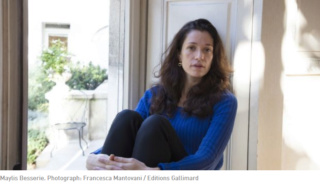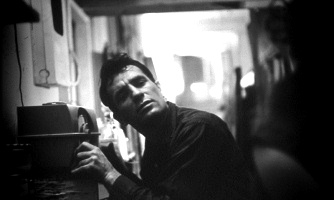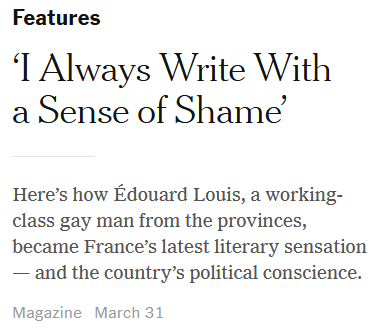Vous n'êtes pas connecté. Connectez-vous ou enregistrez-vous
Aller à la page : |
La presse anglophone Page 5 sur 5
Bas de page ↓Philaunet 

Admin
42L'absolutisme intellectuel ; une description de France Culture - Sam 09 Mai 2020, 12:39
John Lichfield, politico.eu : Coronavirus: France’s ‘strange defeat’ [08-05-2020]
Extraits :
The French are seldom satisfied with anything that their leaders do.
But Macron’s government has, in fact, performed reasonably well in wrestling with an unprecedented, ill-understood and ever-changing foe.
And yet the overwhelming mood in France, not just on social media but in the mainstream media, is not just critical but viciously hostile. This is not just unjustified; it’s dangerous.
Then there is something deeper at play: France’s love of abstraction and intellectual absolutism; its tendency to see everything as a matter of betrayal, conspiracy or national disgrace.
Right-wing commentators portray the shortage of hospital beds as symptomatic of a deep rot in the nation’s will and psyche. Left-wing politicians insist that it is the consequence of the ultra-liberal destruction of the French state (which actually spends over 8 percent of its GDP on the public health system, more than most other EU countries).
France’s destructive penchant for over-analyzing itself in partisan, self-denigrating, absolutist slogans remains as valid as ever.
Extraits :
The French are seldom satisfied with anything that their leaders do.
But Macron’s government has, in fact, performed reasonably well in wrestling with an unprecedented, ill-understood and ever-changing foe.
And yet the overwhelming mood in France, not just on social media but in the mainstream media, is not just critical but viciously hostile. This is not just unjustified; it’s dangerous.
Then there is something deeper at play: France’s love of abstraction and intellectual absolutism; its tendency to see everything as a matter of betrayal, conspiracy or national disgrace.
Right-wing commentators portray the shortage of hospital beds as symptomatic of a deep rot in the nation’s will and psyche. Left-wing politicians insist that it is the consequence of the ultra-liberal destruction of the French state (which actually spends over 8 percent of its GDP on the public health system, more than most other EU countries).
France’s destructive penchant for over-analyzing itself in partisan, self-denigrating, absolutist slogans remains as valid as ever.
Philaunet 

Admin
43''Maylis Besserie works as a producer for the radio channel France Culture'' - Dim 14 Juin 2020, 14:50
Maylis Besserie’s Le Tiers Temps: homage to Beckett and Joyce The Irish Times, Clíona Ní Ríordáin , Wed, Jun 10, 2020
Alors que le récit autobio, "La vie ordinaire", promu urbi et orbi par son auteur, employée de la station le matin, ne vaut pas tripette, le roman "Le Tiers Temps", d'une autre employée de FC, semble prometteur. Forcément, la première raconte ce que ceci et cela disent d'elle, ce qui n'a aucun intérêt, tandis que la seconde a écrit un roman sur la vieillesse en s'appuyant sur la fin de vie de Samuel Beckett.
Ceci donne confiance (à confirmer) :
"Maylis Besserie works as a producer for the radio channel France Culture and Le Tiers Temps is filled with voices" écrit la journaliste qui suggère que travailler dans une radio c'est entendre des voix, ce qui à France Culture n'est pas précisément le cas, les voix des employés ayant cédé la place à leurs minois à la télé. La voix est le cadet des soucis de la direction de l'antenne.
En parlant d'image, on peut saluer la photographie de l'auteur commandée par l'éditeur (pas le plus petit de Paris...), nettement moins glamour que celle de l'autre :

"Besserie wanted to write a novel about old-age. Its physical vicissitudes. Its little humiliations. She consigns the decay to the medical terms: bradykinesia, postular instability, muscular rigidity. These labels cover falls, an increasing inability to write, a loss of autonomy. The Beckett voice carries these preoccupations lightly. It is salted by black humour, ensuring that reading the book is always a pleasure. Besserie also delights in Beckett’s bilingualism and plays back and forth between the francophone and anglophone properties of language, working on the phonetics, segueing between one language and the other. She summons James Joyce too, and has her Beckett reminisce about evenings the two spent together singing, talking and drinking."
À suivre...
Alors que le récit autobio, "La vie ordinaire", promu urbi et orbi par son auteur, employée de la station le matin, ne vaut pas tripette, le roman "Le Tiers Temps", d'une autre employée de FC, semble prometteur. Forcément, la première raconte ce que ceci et cela disent d'elle, ce qui n'a aucun intérêt, tandis que la seconde a écrit un roman sur la vieillesse en s'appuyant sur la fin de vie de Samuel Beckett.
Ceci donne confiance (à confirmer) :
Une recherche donne : Dublin, portrait de la ville en artistes 8 février 2015 Production Maylis Besserie & Sur les lieux de James Joyce Le 10/02/2015 - Un documentaire de Maylis Besserie et Charlotte Roux.Besserie’s connection with Ireland started when her family sent her from her native Bordeaux to spend summers in Ireland learning English. Her attachment to the country was prolonged in her exploration of Irish literature. She has devoted radio programmes to Joyce and Beckett[*]. Her novel is a natural sequel to this dialogue between France and Ireland. It bears the traces of the intensive research lightly; it was fuelled by her thrice yearly visits to the country. Much of the novel was written in the library of the Centre Culturel Irlandais. Besserie availed of the centre’s extensive documentation, but she also wanted to keep the hum of Irish voices in her ear as she wrote the book.
"Maylis Besserie works as a producer for the radio channel France Culture and Le Tiers Temps is filled with voices" écrit la journaliste qui suggère que travailler dans une radio c'est entendre des voix, ce qui à France Culture n'est pas précisément le cas, les voix des employés ayant cédé la place à leurs minois à la télé. La voix est le cadet des soucis de la direction de l'antenne.
En parlant d'image, on peut saluer la photographie de l'auteur commandée par l'éditeur (pas le plus petit de Paris...), nettement moins glamour que celle de l'autre :

"Besserie wanted to write a novel about old-age. Its physical vicissitudes. Its little humiliations. She consigns the decay to the medical terms: bradykinesia, postular instability, muscular rigidity. These labels cover falls, an increasing inability to write, a loss of autonomy. The Beckett voice carries these preoccupations lightly. It is salted by black humour, ensuring that reading the book is always a pleasure. Besserie also delights in Beckett’s bilingualism and plays back and forth between the francophone and anglophone properties of language, working on the phonetics, segueing between one language and the other. She summons James Joyce too, and has her Beckett reminisce about evenings the two spent together singing, talking and drinking."
À suivre...
Philaunet 

Admin
44Larry Elliott, the economics editor at The Guardian - Ven 10 Juin 2022, 10:17
Opinion Russia - Russia is winning the economic war - and Putin is no closer to withdrawing troops The Guardian Larry Elliott Thu 2 Jun 2022.
Philaunet 

Admin
45''Le triste déclin de BBC Radio 4'' - Dim 21 Mai 2023, 09:31
Qui en France écrira un article équivalent pour dresser le constat que fait RegardFC depuis près de 15 ans sur la radio publique, en particulier France Culture ?
Extraits de Gareth Roberts, The sad decline of BBC Radio 4 (The Spectator 20 May 2023). :
Extraits de Gareth Roberts, The sad decline of BBC Radio 4 (The Spectator 20 May 2023). :
J'ai allumé Radio 4 pendant que j'écrivais ces lignes pour vérifier ma théorie selon laquelle on n'est jamais à cinq minutes près de se faire engueuler par la BBC du XXIe siècle.
Les émissions dramatiques et les comédies diffusées sur Radio 4, autrefois le joyau de sa couronne, sont désormais insupportables, une séquence répétitive d'agit-prop idéologique. Le gémissement étroit de la diversité, de l'équité et de l'inclusion (DEI) pèse lourd dans l'air.
Il y a un éternel et fastidieux ressassement des mêmes thèmes, toujours du même point de vue.
L'ancienne Radio 4 était une radio de gauche libérale et souvent exaspérante, mais le virage identitaire de la nouvelle Radio 4 est un désastre. Même les personnes qui sont d'accord avec la ligne approuvée sur ces questions ne veulent pas être engueulées, quoi qu'elles prétendent.
La fragmentation de l'audience due aux changements technologiques est inévitable, oui. Mais il n'était pas nécessaire qu'il en soit ainsi. La BBC aurait pu résister et tenir bon ; elle aurait pu se réjouir du public qu'elle avait, sans essayer de l'échanger contre un public imaginaire de libéraux non binaires obsédés par l'environnement, qui n'existe tout simplement pas.
Gareth Roberts, The sad decline of BBC Radio 4 (The Spectator 20 May 2023).
Radio 4 is in trouble. Listening figures for the station have dipped to their lowest level since 2007. The Today programme, Radio 4’s flagship morning show, is doing particularly badly: its audience fell 12 per cent year on year, from 6.5 million to 5.7 million, according to Rajar. For anyone who has tuned in to Radio 4 recently, this decline won’t come as a surprise.
‘I’ll just stick Radio 4 on’ was the default habit of my life when bored, from about the age of ten in 1978 to fifty in 2018. It felt like the still, reliable centre of the nation. It was also handy as a blood pressure reducing device. But, in the last few years, something changed.
I turned on Radio 4 while writing this to test my theory that you’re never five minutes away from being told off by the 21st century BBC. How long did it take? It took two minutes. An item in You & Yours on herbal teabags revealed that they were organic – hurrah! – but they have too much packaging – boo! (To be fair, You & Yours has long been a marathon whinge.)
I checked again a bit later and immediately got an angry ear blast from environmental campaigner Feargal Sharkey. This was followed by a grovelling ‘What would you like to tell the public?’ interview with Lib Dem leader Ed Davey. Next up was an item about immigration figures which focused on a model, fluent English-speaking Nigerian computer science Masters student, who I might suggest is possibly slightly unrepresentative. (Interestingly, a news report later referred to ‘transitioning’ paedophile sex offender Andrew Miller/‘Amy George’ as a man, which is a first and may be significant.)
The drama and comedy on Radio 4, formerly the jewel in its crown, is now unbearable, a repetitive sequence of ideological agit-prop. The narrow whinge of diversity, equity, and inclusion (DEI) hangs heavy in the air.
A quick glance at Radio 4’s drama offerings presents a similar picture. ‘Dedication plays with the idea, for which there’s good evidence, that the Earl of Southampton was a cross dressing homosexual, with whom, it is possible, Shakespeare had an affair’; ‘Lost Paradise – The UK’s first environmental refugees are due to be displaced in the next 20 years’; the unintentionally Ortonesque billing for South on the Great North Road teases us: ‘HGV truck driver Peggy Charlton’s twice-weekly trips to London lead her husband to suspect she has other interests in her life’.
It’s all so pathetic, so desperate and obvious. Shakespeare: a bit gay? You don’t say! Climate change? Really, please do tell me more. A lady driver? Behind the wheel of a pantechnicon? It would all be very shocking in 1953; back then, you would have emptied the streets with that show. But not today. Other highlights in the schedule include This Morning’s Rylan discussing gay penguins and life in Sudan. And more Shakespeare, with a discussion on toxic masculinity in Hamlet.
There is endless tedious huffing and puffing on the same themes, always from the same viewpoint. Even treasured stalwarts like In Our Time have fallen. The last time I tuned in, one guest academic was blithering the usual boilerplate about gender and ‘non-binary’ identities, at which point I expected to hear the satisfying crunch of Melvyn Bragg’s bouffant as he head-butted the miscreant. But this rubbish was instead just nodded along with. Another door closes, another cultural bolt hole gone.
The old Radio 4 was pinkish left-liberal and frequently infuriating, but the new Radio 4’s identitarian turn is a disaster. Even people who agree with the approved line on these issues don’t want to be told off, no matter what they may claim. This is why DEI/woke/whatever-you-call-it has to be pro-actively kicked out of culture. It pretends to be a nice, kind, ‘just good manners’, but – as Radio 4 is discovering – it’s an audience killer.
What is the BBC going to do about declining listener figures? BBC chief content officer (whatever that means) Charlotte Moore-GPT gave a speech last week, in which she stated, in fluent and quite glorious AI: ‘For the BBC to thrive we have to recognise that all audiences are moving decisively towards the digital and on-demand world. Online take up is now growing fastest among audiences who have traditionally been the biggest users of live broadcast services’.
Audience fragmentation because of tech changes is inevitable, yes. But it didn’t have to be this way. The BBC could’ve resisted and held fast; it could have loved the audience it had, not tried to swap them for an imaginary audience of environmental-obsessed non-binary Lib Dems that simply doesn’t exist.
Gareth Roberts is a TV scriptwriter and novelist who has worked on Doctor Who and Coronation Street
La presse anglophone Page 5 sur 5
Haut de page ↑Aller à la page : |
Permission de ce forum:
Vous pouvez répondre aux sujets dans ce forum
|
|
|





